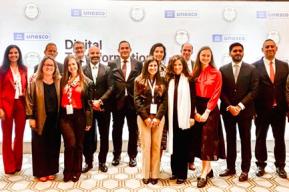Digital Transformation Collaborative
What is the Digital Transformation Collaborative?
The Digital Transformation Collaborative (DTC) is a tech-focused subgroup of the 200+ Global Education Coalition partners that aims to mobilize resources at national scale in collaboration with governments to advance their visions for leveraging sustainable digital transformation in education to achieve SDG 4.
Challenges
- Pilots are small-scale, but digital transformation requires national-scale implementation.
- In-kind partner contributions are limited in duration, leading to sustainability issues.
- Digital transformation is costly and resource intensive. Most countries cannot cover the cost burden entirely from domestic budgets.
The DTC Solution
- Acts at national scale.
- Partners collaborate and advise with one united voice around a common, coordinated plan to ensure swim lanes and efficient use of resources.
- Includes financial engineering (in-kind, financial, domestic, innovative) in the transformation implementation plan.
Digital transformation in education will not happen without highly cooperative multistakeholder partnerships.
What is the DTC’s framework for digital transformation in education?
The DTC created a common framework for system-wide digital transformation in education called the 5 Cs Framework. This framework unpacks the core components of digital transformation in education needed to deliver a positive impact on learners, teachers and all education stakeholders. The framework is accompanied by a descriptive three-stage maturity model to envision a digital transformation journey from emerging to progressing to excelling.
Contexts may not fall neatly into one category, but rather may be emerging in one while excelling in another. The DTC has developed a self-assessment tool for countries to get a bird’s-eye view of priority areas for investment to progress along their journey of digital transformation in education.

It is critical to begin a digital transformation in education journey with a clear vision, policies and goals that engage all education stakeholders. This requires evidence-informed governance, monitoring and evaluation, and data privacy and regulation. Consistent cross-sectoral cooperation would ensure that the benefits of transformation reach the most marginalized.
Digital platforms and high-quality, accessible, curriculum-aligned content sustain a long-term vision for digital transformation in education. These platforms and multi-modal content should be available in national languages to support varied pedagogical models and flexible learning pathways to meet the needs of each learner and empower teachers to create and leverage digital resources where they see fit. Curriculum and assessment should be relevant to society and workforce needs in the digital age by integrating digital skills into all levels of curriculum.
Digital transformation is all about people. Investing in the digital capacities of all education stakeholders—from learners, teachers, and leaders to parents, policy-makers, and local communities—is key to creating a culture of innovation and growth anchored in equity and inclusion and adapted to local needs.
Systems need to consider the quality and sustainability of their hardware, software, electricity, internet access. Safe and secure online and onsite learning spaces, furnished with fit-for-purpose devices and tools that meet diverse needs, should be accessible by all learners and education stakeholders anytime, anywhere. Connectivity coverage is carried out efficiently according to the educational needs of the different learning spaces, which are connected through interoperable data systems.
Digital transformation in education requires a well-established, sustainable, and cost-effective budget. A range of funding sources and intersectoral cooperation ensure an optimized, affordable, equitable, impact-driven allocation of resources across schools and regions that delivers on the vision by enabling a thriving education technology ecosystem that encourages, monitors, and sustains growth.
Feeding into all Cs are data: the data to identify gaps in these five areas of digital transformation, to know which children are learning, what they were learning, and to make data-informed decisions to move from emerging to progressing to excelling. New data also emerges as a result of the process of digital transformation in education. As elements of learning, teaching, management and administration processes are digitalized, new digital data is produced.
Impact at the country-level
DTC support goes directly to countries.
Technical expertise from the DTC is provided at no-cost to countries, making it a powerful advisory group for all components of digital transformation in education: connectivity, content, capacity, coordination and costing.
The DTC differentiates itself by filling major knowledge gaps around where funding is, how to unlock it, and what financial engineering can lead to sustainable digital transformation at the national scale using a combination of domestic, financial, in-kind, and innovative resources.

In 2022, the Coalition mobilized US$50 million in support for Ukraine through financial engineering:
- US$25M in in-kind from partners (software, devices, teacher training)
- US$25M in financial grant funding
Inspired by this experience, the DTC is producing a compendium of financing models for digital transformation in education, experienced by the DTC members themselves to help countries understand what resources may be available to them.
Countries drive the shape of the DTC
The DTC only moves when countries ask it to move. In order to achieve the types of long-term, synergistic partnerships that the DTC envisions, it is necessary that countries meet a certain baseline criteria for engagement. The DTC developed a five-step analysis process to ensure that countries ultimately selected for the DTC are committed to cooperative action and that DTC involvement would have added value. The DTC aims to work with countries in all three levels of digital maturity (emerging, progressing, excelling) to collectively move the needle towards SDG 4 by sharing knowledge, mobilizing resources, and advancing in-country actions co-designed based on the strengths and gaps in a given context.
Who is in the Digital Transformation Collaborative?
Galvanized during the Transforming Education Summit, the DTC's 30 partners — representing EdTech, international organizations, telecoms, NGOs, funds and foundations — have come together to collaboratively steer digital transformation in education towards equity, quality and sustainability.
The DTC Secretariat sits within UNESCO’s Global Education Coalition. As the lead agency for SDG 4, UNESCO is responsible for ensuring that DTC actions drive human-centered digital transformation that supports states to deliver on every person’s right to education.

Get in touch
To express interest in partnering with the DTC, contact us at globaledcoalition@unesco.org.





